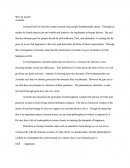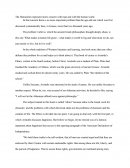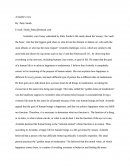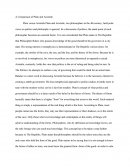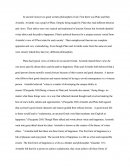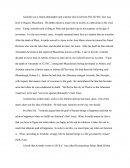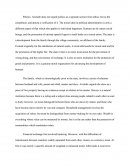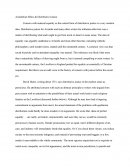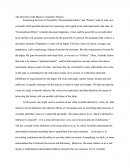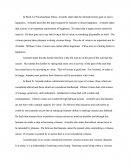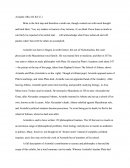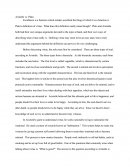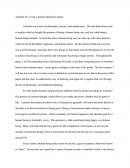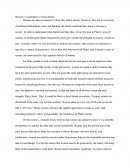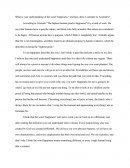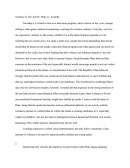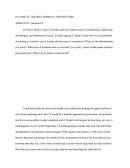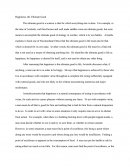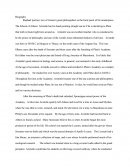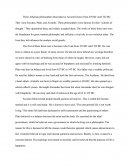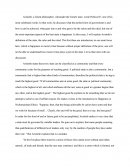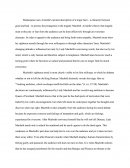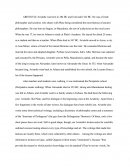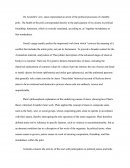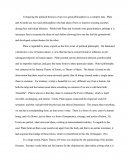Versus Aristotle essays and research papers
Last update: June 10, 2015-
Morality According To Aristotle And Hobbes
Why be moral? Aristotle Aristotle basis of morality centers around what people fundamentally desire. Through his studies he found objects just and wealth and honors to be inadequate to human desires. He said that the ultimate goal for people should be self-sufficient, final, and attainable. In stating this he goes on to say that happiness is the only goal that meets all three of these requirements. Through this investigation it becomes clear that the whole
Rating:Essay Length: 529 Words / 3 PagesSubmitted: September 2, 2010 -
Aristotle's Ethics
The Humanities represent man's concern with man and with the human world. In that concern there is no more important problem than the age-old one which was first discussed systematically here, in Greece, more than two thousand years ago. The problem I refer to, which the ancient Greek philosophers thought deeply about, is this one: What makes a human life good -- what makes it worth living and what must we do, not just merely
Rating:Essay Length: 1,750 Words / 7 PagesSubmitted: September 3, 2010 -
Aristotle
Aristotle's view By: Patty Smith E-mail: Smith_Patty@hotmail.com Aristotle's view Essay submitted by Patty Smith Is life really about the 'money', the 'cash', the 'hoes', who has the biggest gold chain or who drives the shiniest or fastest car, who sells the most albums or who has the most respect? Aristotle challenges views, which are similar to the ones held and shown by rap artists such as Jay-Z and the Notorious B.I.G., by observing that everything
Rating:Essay Length: 567 Words / 3 PagesSubmitted: September 5, 2010 -
Plato Vs. Aristotle
A Comparison of Plato and Aristotle Plato versus Aristotle Plato and Aristotle, two philosophers in the 4th century, hold polar views on politics and philosophy in general. In a discussion of politics, the stand point of each philosopher becomes an essential factor. It is not coincidental that Plato states in The Republic that Philosopher Rulers who possess knowledge of the good should be the governors in a city state. His strong interest in metaphysics is
Rating:Essay Length: 1,867 Words / 8 PagesSubmitted: September 8, 2010 -
Plato Vs Aristotle
In ancient Greece two great written philosophers lived. First there was Plato and then Aristotle. Aristotle was a pupil of Plato. Despite being taught by Plato they had different theories and views. Their ethics were very typical and traditional of ancient Greece but Aristotle detailed virtue ethics and the path to happiness. Plato's political theories for a utopian society varied from Aristotle's view of Ð''best state for each society'. Their metaphysical theories are complete opposites
Rating:Essay Length: 1,825 Words / 8 PagesSubmitted: September 8, 2010 -
Aristotle
Aristotle was a Greek philosopher and scientist who lived from 384-322 B.C who was born in Stagira, Macedonia. His father played a major role in society as a physician in the royal court. Young Aristotle took a liking to Plato and decided to go to his academy at the age of seventeen. For the next twenty years, Aristotle remained there first as a student then as a teacher. After the death of Plato, Aristotle moved
Rating:Essay Length: 1,563 Words / 7 PagesSubmitted: September 10, 2010 -
Aristotle
Politics. Aristotle does not regard politics as a separate science from ethics, but as the completion, and almost a verification of it. The moral ideal in political administration is only a different aspect of that which also applies to individual happiness. Humans are by nature social beings, and the possession of rational speech (logos) in itself leads us to social union. The state is a development from the family through the village community, an offshoot
Rating:Essay Length: 1,061 Words / 5 PagesSubmitted: September 12, 2010 -
Aristotle
Aristotelian Ethics & Distributive Justice Concern with material equality as the central form of distributive justice is a very modern idea. Distributive justice for Aristotle and many other writers for millennia after him was a matter of distributing what each ought to get from merit or desert in some sense. The idea of equality was arguably anathema to Aristotle and most other theorists, including Catholic philosophers, until modern times, indeed until the nineteenth century. A
Rating:Essay Length: 681 Words / 3 PagesSubmitted: September 14, 2010 -
The Doctrine Of The Mean In Aristotle's Politics
The Doctrine of the Mean in Aristotle's Politics. Examining the texts of Aristotle's "Nicomachean Ethics" and "Politics" side by side, one is bound to find parallels between his reasoning with regard to the individual and to the state. In "Nicomachean Ethics" Aristotle discusses happiness, virtue, and the good life on an individual level and lays out necessary provisions for the good life of a person. He maintains that virtue is a necessary element of happiness:
Rating:Essay Length: 2,167 Words / 9 PagesSubmitted: September 19, 2010 -
Aristotle's Account Of Virtue In Book Ii Of Nicomachean Ethics
In Book I of Nicomachean Ethics, Aristotle states that the ultimate human goal or end is happiness. Aristotle describes the steps required for humans to obtain happiness. Aristotle states that activity is an important requirement of happiness. He states that a happy person cannot be inactive. He then goes on to say that living a life of virtue is something pleasurable in itself. The virtuous person takes pleasure in doing virtuous things. The role of
Rating:Essay Length: 1,584 Words / 7 PagesSubmitted: September 21, 2010 -
Aristotle
Aristotle (384-322 B.C.E.) Mine is the first step and therefore a small one, though worked out with much thought and hard labor. You, my readers or hearers of my lectures, if you think I have done as much as can fairly be expected of an initial start. . . will acknowledge what I have achieved and will pardon what I have left for others to accomplish. Aristotle was born in Stagira in north Greece, the
Rating:Essay Length: 1,242 Words / 5 PagesSubmitted: September 23, 2010 -
Aristotle Vs. Plato
Aristotle vs. Plato Excellence is a function which renders excellent the thing of which it is a function is Plato's definition of virtue. What does this definition really mean though? Plato and Aristotle both had their own unique arguments devoted to the topic at hand, and their own ways of describing what virtue really is. Defining virtue may seem to be an easy taste, but to truly understand the arguments behind the definition can prove
Rating:Essay Length: 1,479 Words / 6 PagesSubmitted: September 30, 2010 -
Aristotle
Aristotle Ð'- Living a human life/human nature Aristotle was a man of philosophy, science, and mathematics. He used these three tools to explain what he thought the purpose of being a human being was, and just what being a human being entailed. To describe what a human being was, he came up with many theories, which involved friendship, happiness, and human nature. He also believed that not everyone was a perfect human, meaning, there were
Rating:Essay Length: 1,649 Words / 7 PagesSubmitted: October 5, 2010 -
Plato Vs Aristotle's View Of Women
Women: Counterparts or Subordinates Women are often overlooked in how they add to society. However, they are a crucial part in defining relationships, roles, and families, all which contribute their share to forming a society. In order to understand what distinct part they play, let us first look at Plato's views of women, in which equal chance between the sexes give women the potential to achieve, similar to men. Aristotle, whom we will next look
Rating:Essay Length: 1,370 Words / 6 PagesSubmitted: October 6, 2010 -
Aristotle
What is your understanding of the word "happiness," and how does it compare to Aristotle's? According to Aristotle "The highest human good is happiness" it is a kind of work. He says that humans have a specific nature, and those who fully actualize that nature are considered to be happy. All human actions have a purpose, which I think is completely true. Aristotle argues that life is not meaningless, and there must be an ultimate
Rating:Essay Length: 360 Words / 2 PagesSubmitted: October 12, 2010 -
Violence In The Arts Ð'- Plato Vs. Aristotle
Violence in The Arts Ð'- Plato vs. Aristotle Nowadays, it is hard to turn on a television program, catch a movie or buy your younger sibling a video game without encountering a warning for extreme violence. Everyday, our lives are exposed to violence on the screen, whether it is in the latest Sopranos episode or even watching the six o'clock news. For quite a while now, people have been demanding that stricter censorship be placed
Rating:Essay Length: 1,279 Words / 6 PagesSubmitted: October 16, 2010 -
Aristotle On The Polity
IS A POLITY THE BEST FORM OF CONSTITUTION? ARISTOTLE: Question #7 In Politics Books 3 and 4, Aristotle analyzes different types of constitutions, identifying the strengths and weaknesses of each. Aristotle regards a "polity" as the best for of constitution. According to Aristotle, why is a polity the best type of constitution? What are the characteristics of a polity? What sorts of problems does it overcome? In a polity, whom would posses political power and
Rating:Essay Length: 1,759 Words / 8 PagesSubmitted: October 28, 2010 -
Nicomachean Aristotle Happiness
Happiness, the Ultimate Good The ultimate good in a science is that for which everything else is done. For example, in the time of Aristotle, well bred horses and well made saddles were not ultimate goods, but were means to accomplish the ultimate good of strategy in warfare, which is to win battles. Aristotle explains in book one of Nicomachean Ethics that the ultimate good in life must also be that which is desired for
Rating:Essay Length: 1,169 Words / 5 PagesSubmitted: October 28, 2010 -
Aristotle
Biography Raphael portrays two of Greece's great philosophers as the focal point of his masterpiece The School of Athens. Aristotle has his hand pointing straight out as if he is declaring to Plato that truth is found right here around us. Aristotle was an excellent teacher who is considered to be the prince of philosophy and one of the world's most influential thinkers of all time. Aristotle was born in 384 B.C at Stragyra in
Rating:Essay Length: 2,350 Words / 10 PagesSubmitted: October 30, 2010 -
Socrates, Plato, And Aristotle
Three Athenian philosophers flourished in Ancient Greece from 470 BC until 322 BC. They were Socrates, Plato, and Aristotle. These philosophers were famous for their "schools of thought." They questioned basic and widely accepted ideas. The works of these three men were the foundation for great western philosophy and still play a vital role in our evolution today. The lives they led influence the modern world greatly. The first of these three men is Socrates
Rating:Essay Length: 525 Words / 3 PagesSubmitted: October 31, 2010 -
Aristotle On Politics
Aristotle, a Greek philosopher, Alexander the Great's tutor, wrote Politics Ð'- one of his most celebrated works. In that work, he discusses what the perfect form of government is and how it can be achieved, what goes into it and who gets to be the rulers and the ruled, but one of the most important aspects of the best state is happiness. In this essay, I will explain Aristotle's definition of the state, the ruler
Rating:Essay Length: 1,980 Words / 8 PagesSubmitted: November 1, 2010 -
Macbeth-Response To Aristotle's Tragic Hero
Shakespeare uses Aristotle's ancient description of a tragic hero - a character between good and bad - to portray the protagonist in the tragedy Macbeth. Aristotle's theory that tragedy must evoke pity or fear from the audience can be done effectively through an everyman character. In order to appeal to the audience and bring forth some empathy, Macbeth must show his righteous morals through his own soliloquies or through other characters' lines. Macbeth's changing
Rating:Essay Length: 658 Words / 3 PagesSubmitted: November 3, 2010 -
Aristotle
ARISTOTLE Aristotle was born in 384 BC and lived until 322 BC. He was a Greek philosopher and scientist, who shares with Plato being considered the most famous of ancient philosophers. He was born at Stagira, in Macedonia, the son of a physician to the royal court. When he was 17, he went to Athens to study at Plato's Academy. He stayed for about 20 years, as a student and then as a teacher. When
Rating:Essay Length: 1,063 Words / 5 PagesSubmitted: November 4, 2010 -
Aristotle & Plato On Stasis
On Aristotle's view, stasis represented an arrest of the political processes of a healthy polis. The health of the polis corresponded directly to the participation of its citizens in political friendship, homonoia, which is correctly translated, according to, as "together-mindedness or like-mindedness. Greek's usage usually prefers the impersonal verb form which "conveys the meaning of a conflict that includes the entire polis, not just its factioneers. To provide a broader context for the Aristotelian material,
Rating:Essay Length: 567 Words / 3 PagesSubmitted: November 6, 2010 -
Plato And Aristotle: A Comparison
Comparing the political theories of any two great philosophers is a complex task. Plato and Aristotle are two such philosophers who had ideas of how to improve existing societies during their individual lifetimes. While both Plato and Aristotle were great thinkers, perhaps it is necessary first to examine the ideas of each before showing how one has laid the groundwork and developed certain themes for the other. Plato is regarded by many experts as the
Rating:Essay Length: 1,673 Words / 7 PagesSubmitted: November 6, 2010
